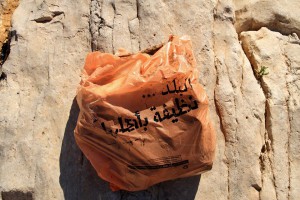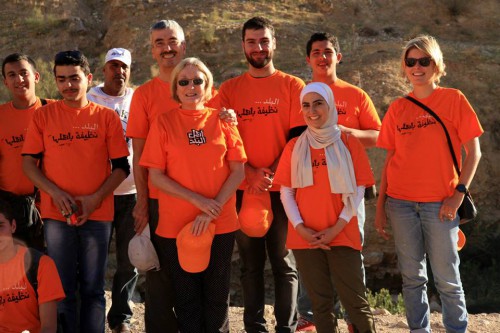12th November 2014
Trashy Stories
Walking down from the Citadel to the centre of Amman a few weeks ago, we saw three boys sitting by the steps. I was showing some guests around, tourists from Britain. The boys were about 7 – 8 years old and were eating crisps and drinking juice, watching people climbing and descending the stairs that lace that part of Amman.
As we walked past them, one of the boys threw his empty juice carton at my feet. I stopped and asked him why he had thrown his rubbish on the ground? Was he not proud of his city? Making the streets dirty was surely a disgrace?
The three boys stared at me with a combination of defiance and incomprehension. They said nothing. Then one of them threw his crisp packet at my feet.
My guests were, needless to say, shocked. And they couldn’t help noticing the piles of rubbish that litter the backstreets of that part of Amman.
The next day the same guests took a taxi to go to Jerash. On the way, they asked their Jordanian driver why there were so many plastic bags and bottles by the side of the road. The driver said that he shared their disgust.
He explained that the people in his village had done something about it: they had banded together and cleaned the streets and the surrounding fields. This had not been a flash-in-the-pan. They wanted a lasting change of mindset by educating citizens not to leave their rubbish outside their houses and to take their things home if they went out to picnic. It had been hard-going, but they had made a difference.

Taking ownership of the problem is part of the philosophy of the Ahel Al-Balad initiative launched last year by a group of Jordanians with seed-funding from the British Embassy and contributions from private companies. The very name “Ahel Al-Balad” signifies that the people residing in a place should look after it. I joined them last weekend to help clean up part of Wadi Hidan near Madaba.
Four young Jordanian lads from Amman were part of the group: Saeed, Faris, Mulham and Ahmed. I asked them why they were there. They said that they wanted to do something to help Jordan. They were distressed by the rubbish in their part of the city. Neighbours threw their rubbish outside their houses, even throwing bags off the balcony into street.
They came to help because they cared for their country. Together with other volunteers, we picked up plastic bottles, plastic cups, cigarette packets and even used nappies (diapers). We filled over 50 bags of rubbish from 3 beautiful spots. This included enough abandoned shoes to open a shoe shop.
Why are these stories important? It takes a plastic bottle about 450 years to biodegrade. An aluminium can takes 200 years. Left out in the street, by the road and in the country, these items are creating a long-lasting environmental and health hazard. Yet on this expedition, we only scratched the surface of the trash in that beautiful wadi.
Initiatives which mobilise well-meaning individuals to go out to clean parts of the country are all well and good. But they won’t make a difference until the root cause is tackled: to stop people leaving their rubbish behind in the first place. That needs an awareness-raising campaign so that every citizen realises that they have an individual responsibility to the collective welfare of the community.
Changing attitudes is of course hard. Incentives are needed to encourage people to take their rubbish home; and maybe disincentives for those who break the rules and leave their rubbish, eg businesses who “flytip”, ie dump their building rubble in the countryside.
My visitors went home deeply impressed by their visit to Jordan. They loved Petra and Jerash and Wadi Rum. But their parting words were poignant: “Great Visit. Loved Jordan. Pity about the plastic bags.”

Thank you Mr. Millett for your touching article .Your feeling of belonging to our dear country Jordan is highly honorable. I hope your story will enhance the awareness needed in our mission .
Hi my school needs such initiative realy u feel happy to see such enthusiasim
In my secondary school way back when (1957-1962) our wonderful headmistress had a brilliant plan to deter the dropping of litter in and around the school : she appointed the youngest children Litter Monitors. They were full of themselves, of course and eagerly looked for a chance to be able to reprimand more senior girls. The more senior girls didn’t want to be rebuked by these little people and so ceased to drop litter.
Could there not be a schools’ initiative in Jordan to try to get their elders to realise that litter despoils their beautiful country and to show that they have pride in their home?